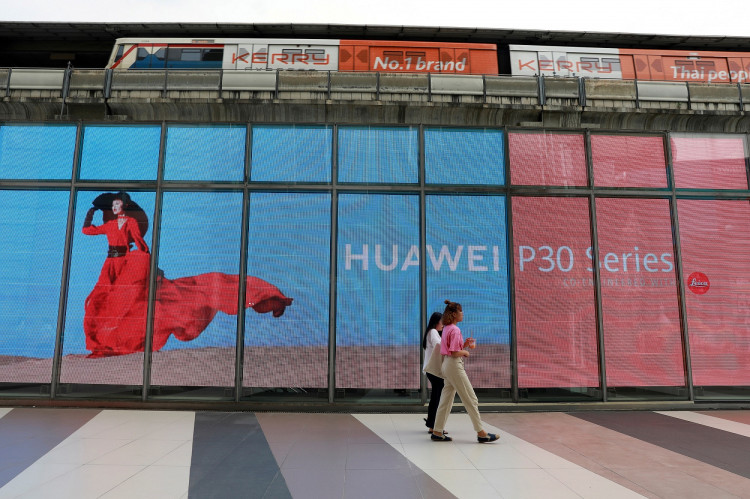Myanmar government showed their eager embrace of Chinese tech giant Huawei to participate in Myanmar’s future communication network construction
28 พฤษภาคม 2562
As the U.S. government hit it with severe sanctions in its escalating trade spat with China, Myanmar government officials showed their eager embrace of Chinese tech giant Huawei, pledging to allow the controversial company to help build the Myanmar’s communication network.
The pledge was made on Friday at the Myanmar Indoor Coverage Digitalization Summit 2019, jointly organized by the Federation of Myanmar Engineering Societies (Fed. MES) and Huawei and attended by officials from the Ministry of Construction, the Ministry of Transport and Communications and the Fed. MEM.
Despite the U.S cutting relations with Huawei over national security concerns, Deputy Director General of the Posts and Telecommunications Department, Ministry of Transport and Communications U Soe Naing praised Huawei for its “support and trusted network solutions for Myanmar’s communication network development.”
“We welcome Huawei to participate in Myanmar’s future communication network construction,” he said, but added that Myanmar will not prohibit any equipment suppliers from competing.
The summit came after the Fed. MES and Huawei signed a two-year Memorandum of Understanding (MOU) in April to promote the development and release of indoor coverage and FTTH (Fiber to home) standards in Myanmar. According to the MOU, Huawei will collaborate with MES to provide assistance in the development of indoor cellular coverage, fiber optic to home/business (FTTX) standards, technical skills training for new generations of engineers, cloud technology development, e-learning, certification programs and internship programs.
Huawei has suffered for some time from allegations that it has close links to the Chinese government, including making equipment with ‘backdoors’ the Chinese government could use for spying. No evidence has been produced publicly supporting such allegations, and the company rejects the claims.
The company’s chief financial officer, Meng Wanzhou, was arrested in Canada in December at the request of the U.S., which accuses the firm of committing fraud by lying to U.S. banks to avoid complying with American trade sanctions on Iran. Huawei rejects those charges, too.
“We are pleased to see Huawei and Fed. MES [cooperating],” Permanent Secretary for the Ministry of Construction U Win Tint said. He thanked the company for “its constructive efforts for the construction industry in Myanmar,” saying he hoped “all the industry would share all of their advice and work together for the technology development in the country.”
Last week, U.S. President Donald Trump issued an executive order that added Huawei to a list of companies identified as posing a national security risk, known as the “Entity List,” thereby prohibiting them from doing business with U.S. companies. Later, the U.S decided delayed the ban by 90 days.
Alphabet Inc.’s Google also suspended Huawei’s access to its services. Huawei can still use Android and its open-source platform but not the Google Play Store or other Google-run services. American chipmakers Intel, Qualcomm, Xilinx and Broadcom have also halted shipments to Huawei.
UK-based chip designer ARM also joining the Huawei ban as its chipset design contains “U.S.-origin technology.”
Huawei was also barred from membership in the SD Association, meaning it can’t release new models with a microSD slot.
At the summit, Huawei Myanmar Chief Executive Officer Zhang Liman explained the importance of the future 5G rollout. Digitalized indoor networks, he said, are critical for establishing smart cities and indoor coverage digitalization is the inevitable future of the industry.
Myanmar is eager to develop smart cities across the country. Ranked by CIO Asia at fifth in the top 10 cities in Southeast Asia in the process of becoming “smart cities,” Mandalay’s government is planning to sign a deal with Huawei to provide surveillance cameras and other security equipment for use in their own “Safe City” plan.
Chairman of Fed. MES U Aung Myint said the need for technical support in the country’s real estate, telecom and other sectors for digitalization and indoor coverage is great, as current indoor experiences do not meet expectations—especially in large-scale complexes—despite people’s demands for high-quality network services.
U Aung Myint touted Huawei as a leading Information and Communication Technology (ICT) company, saying he’s glad to team up for the sector’s development in Myanmar.
In December, Huawei signed a MOU for a three-year ICT Talent Development Program with the Rectors’ Committee for cooperation on six projects: an ICT Diploma Course system, a “Seeds for the Future” program, the establishment of a Huawei Authorized Information and Network Academy (HAINA), an ICT Talent Scholarship for university students, support for ICT-related scientific research and a Youth Open Day at Huawei Customer Solution Innovation & Integration Center (CSIC).
(The Irrawaddy: https://www.irrawaddy.com/business/spurned-west-embraced-myanmar.html )











